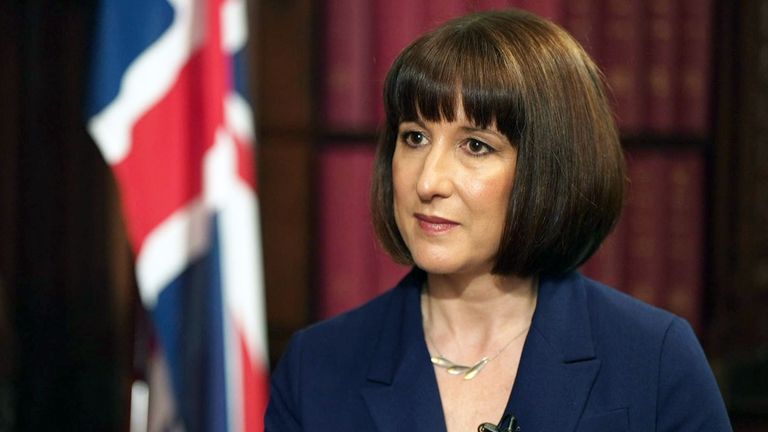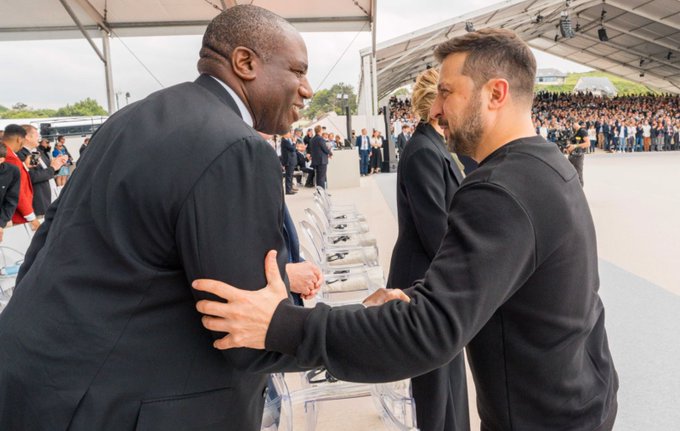Keir Starmer's Top New UK Labour Cabinet Team
KeirStarmer'sTopNewUKLabourCabinetTeam
UK Election Sky Results Roundup 4th July 2024
https://www.inltv.co.uk/index.php/uk-election-sky-results-roundup-4th-july-2024
I Will Always Love My Mum Even Though She Cheats At Bridge And Falls Asleep During My TV Shows
Victoria Starmer: The Jewish, low-profile wife of the new UK prime minister | The Times of Israel

Britain's incoming Prime Minister Keir Starmer and leader of the Labour Party, and his wife Victoria pose on the steps of 10 Downing Street in London on July 5, 2024 (Photo by HENRY NICHOLLS / AFP)

Victoria Starmer, wife of Britain’s opposition Labour Party leader Keir Starmer, watches as he speaks at the Labour Party conference in Liverpool, England, Tuesday, Oct. 10, 2023.(AP Photo/Jon Super)
LONDON (AFP) — Victoria Starmer, whose husband Keir is the new UK prime minister, works in the public health service, is hardly photographed and has kept a low profile on the campaign trail.
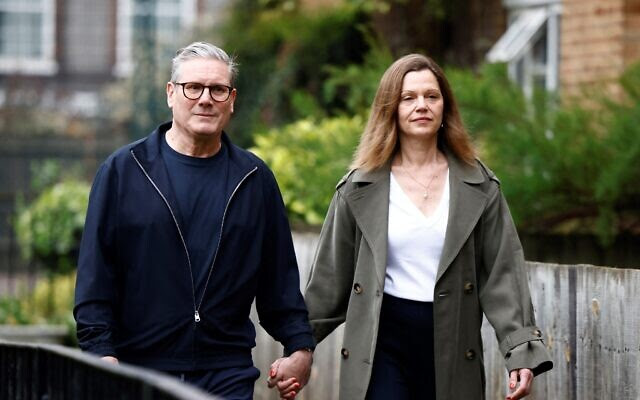
Britain’s then-main opposition Labour Party leader Keir Starmer (L) and his wife Victoria Starmer, arrive at a polling station, in London, to cast their vote for local elections, on May 2, 2024. (BENJAMIN CREMEL / AFP)
But in the coming days, many Britons will begin to recognize the face of the elegant 50-year-old brunette who has been married to the head of the Labour government for more than 15 years.
Since Keir Starmer became Labour leader in 2020 and during the election campaign, Victoria Starmer has not given an interview and has only rarely partaken in politics.
Her public appearances are few and far between: at the polling station on election days, in the stands at the Wimbledon tennis tournament and Taylor Swift’s London concert, or at Buckingham Palace for state dinners and receptions.
A rare exception was when she joined her husband on the stage at the party’s annual conference in 2023, donning a red dress in Labour’s colors.
Even with the move into Downing Street, the former lawyer intends to continue as an occupational health worker in the NHS.
Victoria Alexander was raised in north London. Her father is a former accountant from a Polish-Jewish background and her mother was a community doctor.
She studied law at Cardiff University in Wales where she was head of the student union.
She also volunteered in Labour’s campaign headquarters under Tony Blair before becoming a solicitor in a law firm.
After that, she joined the NHS.
The new prime minister has recounted their first encounter several times, meeting back when they were both working on a court case in the early 2000s.
He called her up to ask if all the documents she prepared were accurate.
Soon after, he asked her on a date to a pub in Camden in north London.
The couple married in 2007 and have two children — a 16-year-old son and a 13-year-old daughter whom Starmer never mentions by name in public to protect their privacy.
They live in Kentish Town, in his north London constituency.
While the prime minister says he is not religious, his wife has passed on Jewish traditions to their children, including going to the synagogue and Friday night dinners.
Always ready with a compliment for “Vic,” as he refers to her, Keir Starmer told Vogue magazine that his wife was “very sassy, very down to earth.”
In another interview, he said her current job gave him a “direct line of sight on a daily basis into the challenges of the NHS and the morale of the staff.”
A family friend once said Victoria complemented her husband and was “literally the yin to his yang.”
Seen by many Labour advisors as an asset to her husband, she has nevertheless kept a safe distance from the media during the election campaign.
Keir Starmer insisted that she wished to focus on their son, who was taking his school-leaving exams this year.
However, she could not stop the press mentioning her testimony in court last month in a case where three pro-Palestinian activists went on trial for protesting outside the family home against Labour’s stance on Israel’s war with Hamas in Gaza.
LONDON (AFP) — Victoria Starmer, whose husband Keir is the new UK prime minister, works in the public health service, is hardly photographed and has kept a low profile on the campaign trail.
But in the coming days, many Britons will begin to recognize the face of the elegant 50-year-old brunette who has been married to the head of the Labour government for more than 15 years.
Since Keir Starmer became Labour leader in 2020 and during the election campaign, Victoria Starmer has not given an interview and has only rarely partaken in politics.
Her public appearances are few and far between: at the polling station on election days, in the stands at the Wimbledon tennis tournament and Taylor Swift’s London concert, or at Buckingham Palace for state dinners and receptions.
A rare exception was when she joined her husband on the stage at the party’s annual conference in 2023, donning a red dress in Labour’s colors.
Even with the move into Downing Street, the former lawyer intends to continue as an occupational health worker in the NHS.

Victoria Alexander was raised in north London. Her father is a former accountant from a Polish-Jewish background and her mother was a community doctor.
She studied law at Cardiff University in Wales where she was head of the student union.
She also volunteered in Labour’s campaign headquarters under Tony Blair before becoming a solicitor in a law firm.
After that, she joined the NHS.
The new prime minister has recounted their first encounter several times, meeting back when they were both working on a court case in the early 2000s.
He called her up to ask if all the documents she prepared were accurate.
Soon after, he asked her on a date to a pub in Camden in north London.
The couple married in 2007 and have two children — a 16-year-old son and a 13-year-old daughter whom Starmer never mentions by name in public to protect their privacy.
They live in Kentish Town, in his north London constituency.
While the prime minister says he is not religious, his wife has passed on Jewish traditions to their children, including going to the synagogue and Friday night dinners.
Always ready with a compliment for “Vic,” as he refers to her, Keir Starmer told Vogue magazine that his wife was “very sassy, very down to earth.”

In another interview, he said her current job gave him a “direct line of sight on a daily basis into the challenges of the NHS and the morale of the staff.”
A family friend once said Victoria complemented her husband and was “literally the yin to his yang.”
Seen by many Labour advisors as an asset to her husband, she has nevertheless kept a safe distance from the media during the election campaign.
Keir Starmer insisted that she wished to focus on their son, who was taking his school-leaving exams this year.
However, she could not stop the press mentioning her testimony in court last month in a case where three pro-Palestinian activists went on trial for protesting outside the family home against Labour’s stance on Israel’s war with Hamas in Gaza.
“I felt a bit sick, to be perfectly honest. I felt apprehensive and uncomfortable,” she said.
In Downing Street, the Starmers intend to be “fiercely protective” of their children from the media spotlight to come, the Labour leader has said.
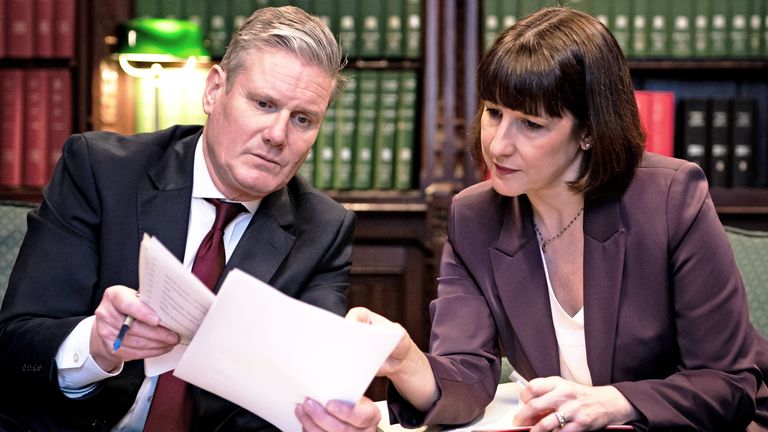
Sir Keir Starmer and Rachel Reeves prepare a response to this year's spring budget

Sir Keir Starmer and Yvette Cooper take part in a roundtable on tackling violence against women and girls.

The shadow foreign secretary with Sir Keir Starmer in Canada
New UK Foreign Secretary David Lammy wants to reset ties with EU
The new cabinet: Who is in Sir Keir Starmer's top team
The Labour leader opts for little change when appointing his new cabinet, with ministers largely sticking with the briefs they were given before the election.
Saturday 6 July 2024
UK Prime Minister Sir Keir Starmer has announced much of his new cabinet - hours after taking power in a landslide victory.
Here's who the new prime minister has appointed:
https://news.sky.com/story/the-new-cabinet-who-is-in-sir-keir-starmers-top-team-13160082
Angela Rayner

Ms Rayner has been Sir Keir Starmer's deputy since he was elected Labour leader in 2020.
She also becomes levelling up secretary - a shadow brief that she also held.
Born and raised on a council estate in Stockport, Greater Manchester, she had her first child at the age of 16, crediting New Labour's Sure Start policy with ensuring her life "wasn't written off".
She worked as a carer and then a trade union leader before entering party politics.
Earlier this year she faced questions over the sale of her council house but police and tax authorities confirmed there had been no wrongdoing.
Rachel Reeves

Ms Reeves worked for the Bank of England and then HBOS before entering the Commons in 2010.
As a teenager growing up in Lewisham, south London, she won the British under-14 chess championship before going to study at Oxford.
She says she turned down a job at Goldman Sachs, despite the fact it would have made her "much richer".
Ms Reeves took over as shadow chancellor in May 2021 and along with Sir Keir has helped reshape Labour's relationship with the business community and has stressed the importance of fiscal discipline. Her younger sister Ellie Reeves is also a Labour MP.
Rachel Reeves: Chess champion to treasury - the UK's first female chancellor
The MP for Leeds West and Pudsey has risen up the ranks to be one of Labour's most influential figures - whose judgement will determine the government's spending policies.
Yvette Cooper

Ms Cooper and her husband Ed Balls are both veterans of New Labour - having had various ministerial roles under Sir Tony Blair and Gordon Brown.
Ms Cooper's experience included chief secretary to the Treasury, work and pensions secretary, as well as health, and housing minister. While at the Department of Health she was the first minister in the UK to ever take maternity leave.
She ran for the Labour leadership against Jeremy Corbyn in 2016, coming third to Corbyn and Andy Burnham.

Yvette Cooper: Elected in two Labour landslides - the home secretary that's back in the limelight

A star under New Labour who was relegated to the backbenches under Jeremy Corbyn, Ms Cooper will now have a defining role in Sir Keir Starmer's new government.
Friday 5 July 2024
After rising to Labour stardom under New Labour, Yvette Cooper was sidelined under Jeremy Corbyn. But now she is back in the limelight after becoming the new home secretary in the new Labour government.
Yvette Cooper was first elected in the 1997 Labour landslide; the previous incumbent was prised from a safe seat to afford her easy entry to the Commons.
Since then, she has been the first female chief secretary to the Treasury, where she was an advocate for a "feminist approach to economics".
But she has also faced a turbulent time in opposition - after being relegated to the backbenches under Jeremy Corbyn; perhaps as a consequence of her public criticisms of him.
Most recently, in her role as shadow home secretary under Sir Keir Starmer, she has promised to run a "hands-on Home Office" with a focus on cutting crime rates.
She will now get the chance to carry out her promise after Sir Keir Starmer made her home secretary after Labour's general election victory.
Many people may also know her from her marriage to Ed Balls, Gordon Brown's former top adviser and confidante. Ms Cooper and Mr Balls married in 1998, and soon became the ultimate power couple. Their marriage made them the first couple to sit in the government cabinet together. They have three children.

Ed Ball and Yvette Cooper were both journalists before being politicians
A family with an impeccable Labour pedigree
Ms Cooper was born in Inverness in Scotland in 1969 but raised in the South East of England in leafy Hampshire.
She was born into a Labour family - her father was a union leader, and her mother was a maths teacher who initially came from a mining community.
Ms Cooper has previously spoken of how her father's unionist values - whom she joined on marches in the early 1980s - have stayed with her throughout her political career.
First taste of politics… 'I organised a prefect's strike'
Ms Cooper attended state comprehensive schools as a child, but has admitted she got the political bug while there - over the issue of "white socks".
She recalls feeling a sense of burning "injustice" when one of the male prefects came to school wearing white socks.
Rwanda plan an 'expensive gimmick'
She made the decision to take away his prefect badge and send him "to the headmaster with our demands".
The perfect career politician's CV
Ms Cooper later attended Oxford University and read PPE - coming away with a first-class degree.
She was then awarded a Kennedy Scholarship in 1991 to study at Harvard University.
She finished her studies with a MSc in economics at the London School of Economics.
A varied early career
Ms Cooper's first job was on a farm picking strawberries and driving a tractor.
She later embarked on a journalism career as lead writer of an economic column for The Independent.
'I did not think I would end up as an MP'
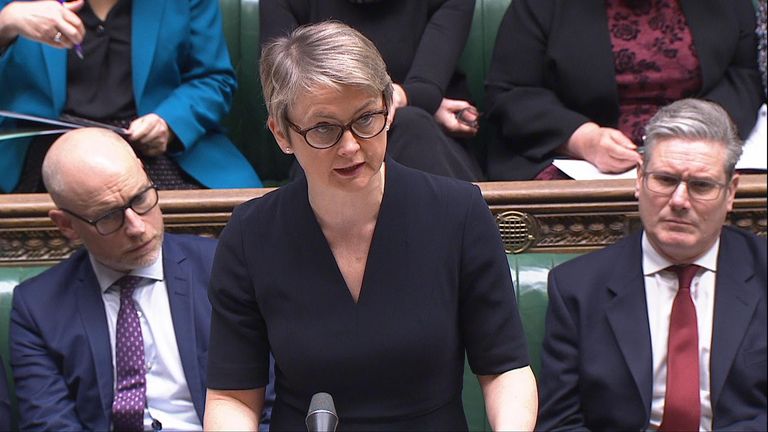
UK is 'desperate for change'
On her feet in the House of Commons
It was 1992 in Arkansas where Ms Cooper made her first impact on the political scene, working on Bill Clinton's successful presidential campaign.
At the same time, she was also working in the office of the then Labour leader John Smith, as an economic researcher.
Ms Cooper was then chosen for the seat of Pontefract and Castleford in 1997 which she won with a majority of 25,725 votes, aged 28.
It's remained a safe Yorkshire seat - although it was renamed Normanton, Pontefract and Castleford in 2010 and now known as Pontefract, Castleford and Knottingley. In the 2019 general election, her majority was reduced to just 1,276 votes.
Ms Cooper won her seat in this year's general election, receiving 17,089 votes. Reform UK's candidate John Thomas was in second place after picking up 10,459 votes.
Time in the House of Commons
Ms Cooper quickly found herself working her way up the ranks in the Labour Party and was allocated her first position as parliamentary under-secretary in the Department for Health in 1999.
Ms Cooper then held multiple junior government roles under Tony Blair.
In 2001, she became the first minister to have a period of maternity leave - though some criticism was levelled at her for this, including being called "the Minister for Maternity Leave".
In 2008, she was the first woman to be appointed as chief secretary to the Treasury, where she spent time highlighting the impact of the recession on women.
After the 2010 election defeat, she got the most votes of any Labour MP in the elected shadow cabinet and took on the role of shadow home secretary.
A tumultuous time in opposition
Ms Cooper faced a tumultuous time in opposition after she was relegated to the backbenches under Jeremy Corbyn's leadership.
In 2015, she ran against Mr Corbyn in the campaign for the Labour leadership, sparked by the resignation of Ed Miliband.
She accused Mr Corbyn, the only leftwinger on the ballot, of "bad economics" and policies which "[weren't] credible".
She came third with 17% of the vote.
Sir Keir Starmer makes her a frontline star again
After Sir Keir was elected leader of the Labour Party, Ms Cooper soon saw the dynamic change within the party and was brought back to the frontbenches.

Sir Keir Starmer and Yvette Cooper take part in a roundtable on tackling violence against women and girls.
Ms Cooper was tasked with the role of shadow home secretary - a position she has held since 2021.
In this role, she has set out a "five-point plan" for her department:
- Crackdown on criminal smuggler gangs, through new cross-border police unit
- Clear the backlog and end hotel use
- Reform legal routes for refugees to stop people being exploited by gangs
- New agreement with France and other countries on returns and family reunion
- Tackle humanitarian crises at source helping refugees in their region
Ms Cooper has also claimed she would run a "hands-on Home Office" if she takes the reins after the election and would focus on cutting crime.
David Lammy

The shadow foreign secretary with Sir Keir Starmer in Canada

Mr Lammy has represented Tottenham, where he grew up, since 2000 when he won the by-election triggered by the death of Labour's Bernie Grant.
New UK Foreign Secretary David Lammy wants to reset ties with EU
https://www.bbc.com/news/
New foreign secretary wants to reset UK-EU ties

David Lammy (R) held talks with Poland’s Foreign Minister Radoslaw Sikorsky
David Lammy’s whirlwind first trip as foreign secretary, organised at very short notice, is not about instant results or even brave new horizons.
It is all about perception - the appearance of a new, vigorous administration, determined to hit the ground running, brimming with goodwill towards some of the UK’s most important partners.
After an evening spent with his German counterpart, Annalena Baerbock - the two found time to watch a few minutes of England’s European Championship quarter-final - Mr Lammy’s tour moved to the bucolic surroundings of the country estate of Poland’s Foreign Minister Radoslaw Sikorsky.
After a couple of hours of talks, it was back on the plane for a short flight north to one of Nato’s newest members, Sweden.
Why Germany, Poland and Sweden?
Partly because of Ukraine. Along with Britain, all three countries play important roles in sustaining Kyiv’s war effort. With the new Defence Secretary John Healey on the ground in Odesa, Prime Minister Sir Keir Starmer’s government is keen to stress that the UK’s commitment to Ukraine will remain rock solid.
Following a meeting with President Zelensky and his counterpart Defence Minister Rustem Umerov, Mr Healey said the UK would provide more artillery guns, a quarter-of-a-million ammunition rounds and nearly 100 precision Brimstone missiles.
"There may have been a change in government, but the UK is united for Ukraine," he said, promising to "reinvigorate" support via increased military aid.
He also pledged to fast-track the reinforcements to ensure they arrive with the next 100 days.
“We want to double down on our commitment to Ukraine,” Mr Lammy said, as dragonflies swooped over a tranquil lake and a pair of majestic eagles circled overhead.
France, in the midst of its own election - one which seems destined to have far-reaching consequences - was not on the itinerary. Not this weekend.
No stop in Brussels, either. Sir Keir has said the UK will not return to the EU “in my lifetime”.
But Poland and Sweden are both key European partners and fellow Nato members - good places for the foreign secretary to start exploring the outlines of closer future relations.
“I want to reset both our bilateral relationship and our relationship with the European Union,” Mr Lammy said, adding a reference to Labour’s still rather nebulous pledge to strike a new EU-UK security pact.
Meanwhile, on a visit to Edinburgh on Sunday, the prime minister said work was already under way to improve the UK's relationship with the EU.
He said his government "can get a much better deal than the botched deal that Boris Johnson saddled the UK with".
Mr Lammy said that when European leaders gather at Blenheim Palace on 18 July for the next meeting of the European Political Community (established by Emmanuel Macron in the wake of Russia’s invasion of Ukraine), “the new spirit of co-operation will be on show”

Lammy and his Polish counterpart embraced ahead of talks
Lammy's concerns: Russia, China, Gaza
The trip comes just days before Sir Keir takes his own first steps on the international stage as prime minister, at the Nato summit in Washington DC.
These are tricky times to be shoring up relationships, with France taking a lurch to the right and the US possibly on the verge of returning the unpredictable Donald Trump to office.
Mr Lammy agreed this was a “tough geopolitical moment”, but said it was important not to confuse disagreements between mature democracies with the threats posed by authoritarian regimes.
“I am concerned when I see Iranian drones turning up in Ukraine,” he said.
“I am concerned when I see shells from North Korea being used here on European soil.
"And of course I'm concerned with the partnership that I see Russia brokering across those authoritarian states.”
Other issues hang heavy over the new foreign secretary’s first trip, in particular the war in Gaza.

In Germany on Saturday, Mr Lammy spoke to the need to strike a “more balanced approach to Israel-Gaza”.
It is not clear exactly what he meant, but with ceasefire talks apparently poised to resume, finding a way to end the Gaza war and revive the Arab-Israeli peace process seems destined to consume a large amount of diplomatic time in the coming months.
For his part, Mr Lammy’s famously anglophile host said the relatively new Polish government shared something in common with the incoming Starmer administration.
Both, Mr Sikorski said, were “the product of the public being tired with enthusiasts on the nationalist side of politics” - a remark which perhaps only partially reflected the true nature of last week’s general election.
Mr Sikorski said he looked forward to “a more pragmatic approach” from Britain to its relationship with Europe and said the two ministers had discussed “some creative ideas of how to further that”.

David Lammy was the first black Briton to join Harvard Law School
He was the first black Briton to attend Harvard Law School, where he met and befriended Barack Obama.
Under New Labour he served as minister for higher education and culture. By contrast, he endorsed his friend Jeremy Corbyn for the party leadership in 2016.
Mr Lammy has written widely about the 2011 London riots, which began in his constituency. He has also condemned Oxford University for not accepting enough black and ethnic minority students.
David Lammy: Everything you need to know about the UK's new foreign secretary
Mr Lammy was a rising star and junior minister under Tony Blair before he refused a frontbench position to become a social and racial justice campaigner, but has now been appointed to one of the top jobs in government.
Labour's David Lammy is known as one of the most outspoken members of the party's frontbench - having had his own national radio show until earlier this year.
He will now be the face of the UK's policy abroad, having been appointed to the role of foreign secretary - one of the top jobs in government.
Richard Hermer KC

Richard Hermer is a high-profile human rights lawyer from Matrix Chambers.
He assumes the role of attorney general, the chief legal adviser to the government.
He replaces Emily Thornberry, who had held the role since November 2021.
The role had been expected to go to Emily Thornberry, who has served as shadow attorney general since 2021.
Ms Thornberry was criticised by the Tories during the election campaign for claiming the policy of ending tax breaks for private schools would mean bigger classes in state schools.
Mr Hermer is not an MP, so he will be made a peer in the House of Lords in order to serve his role.
Baroness Smith of Basildon

Baroness Smith was the MP for Basildon from 1997 and 2010 and served as parliamentary private secretary to Mr Brown when he was prime minister.
She lost her seat, then renamed South Basildon and East Thurrock, to the Conservatives in 2010 but was appointed to the House of Lords shortly afterwards.
From 2015 she served as leader of the Opposition in the Lords - a role that will be transferred to the government equivalent.
As House of Lords leader Baroness Smith will lead the government benches in the upper chamber and be responsible for government business.
Pat McFadden

A veteran of the Blair years, Mr McFadden has emerged as a key figure in Sir Keir's inner circle. As Chancellor of the Duchy of Lancaster he will take a co-ordinating role at the centre of government and will have responsibility for making key decisions.
He is one of the few members of the new cabinet that has experience serving in government - under Gordon Brown he served as parliamentary under-secretary at the Cabinet Office and later as a minister in the business department.
Shabana Mahmood

Ms Mahmood became the first female Muslim in the House of Commons when she was elected in 2010.
She was born in her Birmingham constituency, where her father later became chairman of the local Labour Party. The family spent her first seven years in Saudi Arabia while he worked as a civil engineer, however.
She didn't leave Labour when Sir Tony Blair backed the invasion of Iraq, instead running to replace her local MP when she did. She has spoken widely about Sir Keir Starmer's perceived shortcomings on the situation in Gaza.
Wes Streeting

Wes Streeting was elected to the marginal seat of Ilford North with just 589 votes in 2015, having served as deputy leader of the local council beforehand.
He was raised on a council estate in London's East End. His maternal grandparents both spent time in prison, his grandmother frequenting Christine Keeler while behind bars.
Mr Streeting was a vocal critic of Jeremy Corbyn and has received criticism for some of his policies on the NHS, which he credits with saving his life after he was diagnosed with kidney cancer.
Bridget Phillipson

Ms Phillipson was brought up on a council estate in the North East of England, where she said in an interview she was "bullied for being poor".
After her mother enrolled her in Saturday drama school, she got a background role in BBC children's show Byker Grove.
Before going into politics, she managed the women's refuge that her mother set up while she was at school.
Elected in 2010, she became shadow education secretary the following year, promoting a wider rollout of school breakfast clubs and hoping to "break the class ceiling" for young people through education.

Bridget Phillipson: Bullied at school and rotten windows - Labour's new education secretary
The education secretary was brought up on benefits and studied at Oxford before returning to her hometown in the North East to work in local government and a women's refuge.
Friday 5 July 2024
https://news.sky.com/story/who-is-bridget-phillipson-labours-education-secretary-13152884
Bridget Phillipson joined the Labour Party aged just 15.
Twenty-five years later, Ms Phillipson has been re-elected as an MP for the fourth time and after Labour's win in the general election, she has been appointed education secretary.
She was born and raised in the former mining town of Washington, Tyne and Wear, to a single mother, Clare Phillipson.
The family grew up in a council house and relied on benefits.
In an interview with The Times, Ms Phillipson recalled having "no upstairs heating" and "rotten windows".
She said she was "bullied at school" because "parents didn't want their children mixing with people like me".
Her father was absent, having left her mother while she was still pregnant.
He lived nearby but didn't have a relationship with his daughter.

After years of struggling, her mother bought their council house and set up a women's refuge called Women In Need.
Meanwhile, Bridget became a Grade A pupil at secondary school, with her mother insisting she went to drama school on the weekends, which landed her a role as an extra in the TV series Byker Grove.
Having entered into politics as a Labour Party member at 15, Ms Phillipson got into Oxford to study modern history, where she became co-chair of the university Labour club.
When she finished her degree, she returned to the North East and worked in local government before managing the refuge her mother founded between 2007 and 2010.
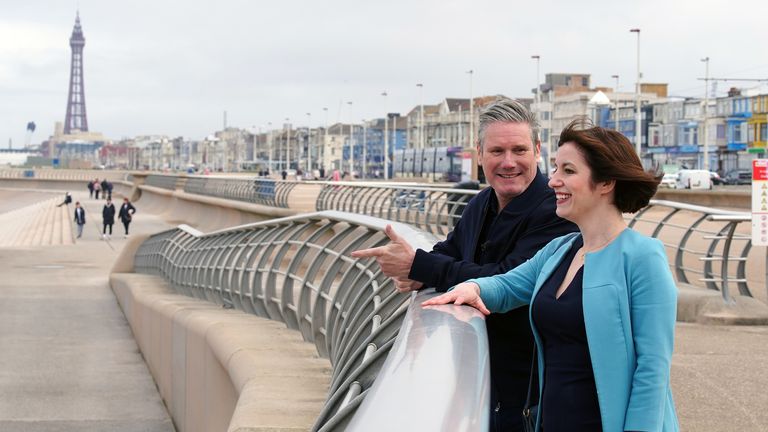
She was put forward as a parliamentary candidate for Houghton and Sunderland South in 2010 as part of Labour's all-women shortlists, brought in by Sir Tony Blair in 1997 to improve female representation.
Although Labour lost the election, she was elected as an MP with a majority of just over 10,000.
After that, Ms Phillipson was re-elected in 2015, 2017, and 2019.
Removing the 'class ceiling' through education
She refused to be part of the shadow cabinet under Jeremy Corbyn's leadership, accusing him of a "lack of self-reflection" over the party's antisemitism scandal.
When Sir Keir Starmer replaced him in 2020, she was given the position of shadow chief treasury to the Treasury, before taking on her current role as shadow education secretary in November 2021.
As a recipient of free school meals, and crediting Education Maintenance Allowance with her decision to pursue A-levels instead of getting a job, Ms Phillipson has been fundamental in shaping Labour's education policies.

Her shadow cabinet is pledging universal free breakfasts for primary school children, 3,000 new primary school-based nurseries, and 100,000 new nursery places.
She has vowed to tackle the "class ceiling" through education, telling Politics Home in 2023: "Kids from working-class backgrounds often don't get a second chance.
"If you're better off, often your parents can step in, they can provide money, they can give you those opportunities. But for lots of kids from communities like mine, they only get one chance at it."
Among the other policies she's been behind are reforming maths teaching to make it "real-world"-relevant and implementing two weeks' obligatory work experience for all young people.
She has been criticised for failing to rule out an increase in tuition fees, in a departure from Sir Keir's pledge to abolish them when he was first opposition leader.
Ms Phillipson splits her time between Sunderland and Westminster, with her husband Lawrence, and their two children.
Ed Miliband

Mr Miliband has been the MP for Doncaster North since 2005 and has played a big role in Labour politics.
He was a special adviser to Gordon Brown while he was chancellor while his brother, David, worked for Sir Tony.
In 2010 he was elected Labour leader in a fractious contest with his brother. He stayed on until 2015 and resigned following the party's general election defeat that year.
He is said to have a close personal relationship with Sir Keir, whom he helped with his campaign to become an MP back in 2015.
Peter Kyle

Mr Miliband has been the MP for Doncaster North since 2005 and has played a big role in Labour politics.
He was a special adviser to Gordon Brown while he was chancellor while his brother, David, worked for Sir Tony.
In 2010 he was elected Labour leader in a fractious contest with his brother. He stayed on until 2015 and resigned following the party's general election defeat that year.
He is said to have a close personal relationship with Sir Keir, whom he helped with his campaign to become an MP back in 2015.
Peter Kyle
Peter Kyle overcame struggles with severe dyslexia to return to school at the age of 25 and ultimately get a PhD in community economic development.
He was chair of the business, energy and industrial strategy select committee and part of the public inquiries into the collapse of Carillion and Thomas Cook.
Before politics he worked as an aid worker in the Balkans, setting up an orphanage in Romania, and working as a cabinet office adviser on social exclusion on his return to the UK.
In 2012 his long-term partner and his mother died one day apart from each other.
Louise Haigh

Louise Haigh has been an MP where she grew up in Sheffield since 2015.
Both her grandfather and uncle were trade union officials.
She worked in parliament as a coordinator while volunteering as a special constable with the Met Police in Brixton, south London, before becoming an MP.
This set her up for being shadow policing minister under Jeremy Corbyn.
Although she endorsed the former Labour leader she now says she regrets the decision, backing Andy Burnham, Lisa Nandy, and Jess Phillips for successive leadership bids.
Liz Kendall

Liz Kendall came last in the Labour leadership contest that saw Jeremy Corbyn elected in 2015.
Before she entered parliament five years earlier, she worked for various think tanks and charities with a focus on health and social care, including the Ambulance Service Network and Maternity Alliance.
She ventured in and out of politics advising former caretaker Labour leader Harriet Harman and former health secretary Patricia Hewitt.
In the shadow cabinet under Sir Keir she has had the health and social care and pensions brief.
Outside of politics she dated comedian Greg Davies.
Jonathan Reynolds

Jonathan Reynolds' political career began as an assistant to a Labour councillor in Stockport.
Although he had aspirations of becoming a lawyer, they were put on hold when he became a father in his early 20s.
After stints as a councillor and a parliamentary assistant he ran successfully to replace his boss James Purnell MP when he announced he was stepping down.
He has two dogs named Kennedy and Clinton and employs his wife as a senior parliamentary assistant.
John Healey

Another veteran of the Blair years, John Healey became parliamentary under-secretary of state for adult skills as soon as he was elected as an MP in 1997.
His father received an OBE for his lifelong work countering violence and aggression.
Throughout New Labour he was financial secretary to the treasury, minister for local government, and for housing.
He voted in favour of UK involvement in the Iraq War and has visited Ukraine, where he promised Labour's commitment would be "ironclad". He has matched the previous government's commitment to raise defence spending from just over 2% of GDP to 2.5% by 2030.
Steve Reed

Steve Reed, the former leader of Lambeth council, was elected to parliament in the by-election in 2012 for Croydon North, which was changed to Streatham and Croydon North at this election.
He has held a number of shadow cabinet roles, including as shadow levelling up secretary and shadow justice secretary, before he was appointed shadow environment secretary - a role he now holds in cabinet.
Lisa Nandy

Lisa Nandy was re-elected as the MP for Wigan, a constituency she has represented since 2010.
Ms Nandy ran against Sir Keir in the Labour leadership contest that took place after Jeremy Corbyn quit following the disastrous 2019 general election defeat.
She has held a number of shadow cabinet roles, including as shadow international development secretary and shadow foreign secretary.
Ms Nandy has now been appointed as shadow culture secretary, replacing Thangam Debbonaire who lost the seat of Bristol Central to the Greens.
Hilary Benn

Hilary Benn is the son of the late left-wing minister and campaigner Tony Benn, who served under prime ministers Harold Wilson and James Callaghan.
On his by-election campaign trail he famously set himself apart from his father, describing himself as a "Benn not a Bennite".
His role as Northern Ireland secretary comes after a stint as chair of the Commons Brexit committee where he was heavily involved in the UK withdrawal and ensuing border issues in Ireland.
He also has previous experience as a cabinet minister, first entering under Blair as international development secretary in 2003.
Ian Murray

Ian Murray was brought up on a council estate on the outskirts of Edinburgh. He accredits the "failures" of his local MP, Thatcherite minister Malcolm Rifkind, to act on damp in his childhood home with motivating him to get into politics.
After serving on Edinburgh Council, he was elected as MP for Edinburgh South in 2010 following his predecessor Nigel Griffith's downfall in a sex scandal.
He was among the Labour MPs who resigned from the shadow cabinet after the Brexit referendum and was an ardent critic of Jeremy Corbyn.
Describing himself as a "lifelong" opponent of the Trident nuclear programme, he may struggle to fall in line with Sir Keir Starmer's commitment to maintain it.
He voted for Scotland to remain as part of the UK in the 2014 Scottish independence referendum and reported "hostilities" from the 'yes' campaign.
Jo Stevens

Jo Stevens served as shadow Wales secretary under both Jeremy Corbyn and Sir Keir Starmer.
Her resignation under Corbyn came after he imposed a three-line whip on backing the government's EU withdrawal bill, which she said she could not comply with as a "passionate European".
She is largely a unionist and against devolution of issues such as policing and gender recognition.
Before the election campaign, her office was vandalised after she abstained from the motion on a ceasefire in Gaza.
Lucy Powell

Lucy Powell became the first female MP to represent a Manchester constituency when she was elected in the by-election for Manchester Central in 2012.
She takes on the role of leader of the Commons, where she is responsible for delivering Sir Keir's legislative agenda in the Commons and keeping MPs updated about forthcoming business and debate in the Commons Chamber.
Previous roles she has held include shadow education secretary under Jeremy Corbyn and as shadow culture secretary under Sir Keir.
Darren Jones

He has only been in parliament since 2017, but Darren Jones has been widely touted as one of Labour's rising stars.
Born and bred in his Bristol constituency, he worked in the NHS before training as a lawyer.
He made an unsuccessful bid at parliament in 2010, becoming an active union member instead.
On social media during the campaign he's gained traction for his "candid" posts about life in politics. A leaked recording revealed him saying Labour's net-zero plans would cost "hundreds of billions", forcing the party to make clarifications.
Outside of his day job he's a keen vegan cook and plays the saxophone.
Sir Alan Campbell

Sir Alan Campbell is a Labour stalwart who was first elected in 1997 for the constituency of Tynemouth.
He also has experience in government, having served as a minister in the Home Office under Mr Brown.
He retains his role of chief whip, meaning he is responsible for party discipline and the whipping system - ensuring that MPs attend votes and vote in line with the leadership.
Richard Hermer KC

Richard Hermer is a high-profile human rights lawyer from Matrix Chambers.
He assumes the role of attorney general, the chief legal adviser to the government.
He replaces Emily Thornberry, who had held the role since November 2021.
The role had been expected to go to Emily Thornberry, who has served as shadow attorney general since 2021.
Ms Thornberry was criticised by the Tories during the election campaign for claiming the policy of ending tax breaks for private schools would mean bigger classes in state schools.
Mr Hermer is not an MP, so he will be made a peer in the House of Lords in order to serve his role.
Baroness Smith of Basildon

Baroness Smith was the MP for Basildon from 1997 and 2010 and served as parliamentary private secretary to Mr Brown when he was prime minister.
She lost her seat, then renamed South Basildon and East Thurrock, to the Conservatives in 2010 but was appointed to the House of Lords shortly afterwards.
From 2015 she served as leader of the Opposition in the Lords - a role that will be transferred to the government equivalent.
As House of Lords leader Baroness Smith will lead the government benches in the upper chamber and be responsible for government business.

